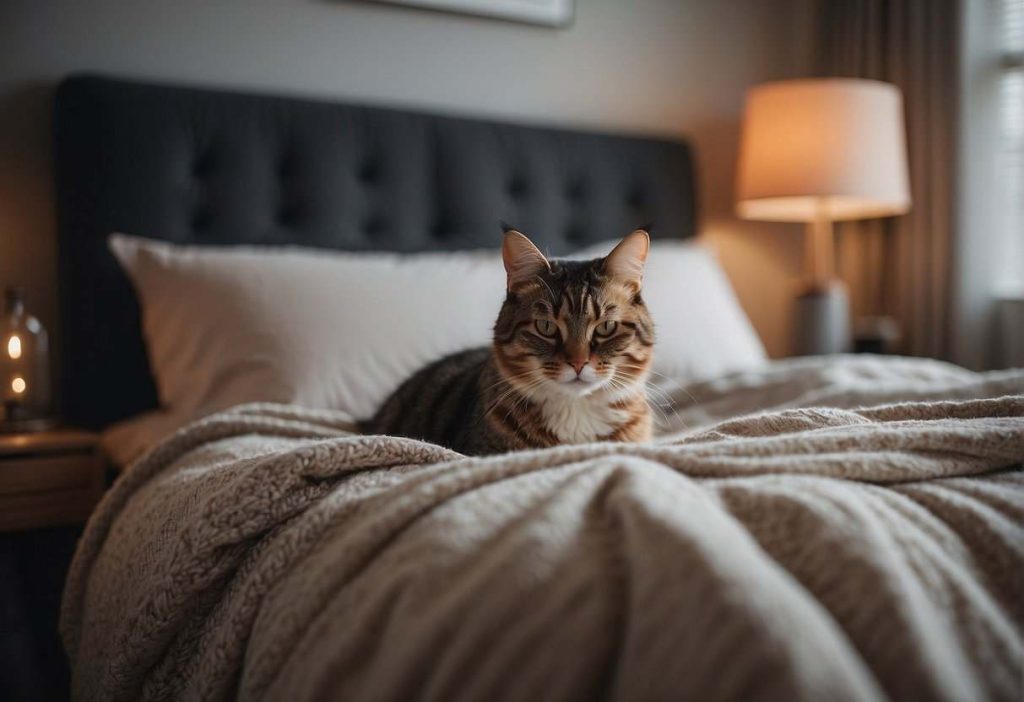You’ve made your bed cozy and inviting, but as you glance over, instead of your feline friend curled up at the foot of the bed, there’s a space. You wonder, “Why doesn’t my cat sleep with me anymore?”
This sudden change in your cat’s behavior can be disconcerting. Cats are creatures of habit, and any shift in routine, such as where they choose to sleep, often signals that something is amiss. (1)
Understanding the fickle nature of cats is crucial because their actions can be influenced by a myriad of reasons, from health issues to changes in the environment.

Fortunately, unraveling this mystery isn’t as daunting as it seems. Cat owners might not realize that subtle changes in their own lives can have significant impacts on their pets.
By observing and addressing potential stressors that may affect your cat’s comfort and security, you can begin to understand the root of this change.
This article aims to shed light on why your cat may have stopped sleeping with you and provide expert advice on how to encourage your cat to return to your shared sleep space.
Key Takeaways
- A change in sleeping patterns can indicate health or environmental issues affecting your cat.
- Observing and addressing potential stressors can help identify the reason for a cat’s altered behavior.
- Expert solutions offer ways to encourage your cat to resume sleeping with you.
Why Doesn’t My Cat Sleep with Me Anymore?
Understanding Your Cat’s Behavior
Changes in Sleeping Habits Over Time
Cats change their sleeping spots for various reasons. They’re notorious for their love of cozy, warm places and may switch locations as they find new favorite spots in the house. (2)
The Impact of Age and Health on Sleep Patterns
As cats age, their sleep patterns often change. They may seek a quieter place if they’re not feeling well, or if they’re experiencing joint pain, they might avoid jumping onto a high bed.
Common Reasons for This Behavior Change
Environmental Factors and Stress
Changes in the home, like new pets or rearranged furniture, can stress your cat out. They might seek solitude or a safe space that’s just theirs.
- New pets: Jealousy or territorial behavior can arise.
- Loud noises: They could disrupt your cat’s peace.
- Furniture changes: They might remove previously favored sleeping spots.
Health Issues and Discomfort
Health problems can affect a cat’s comfort. If your bed is no longer the haven it once was, consider these issues:
- Arthritis or pain: It can make jumping onto the bed difficult.
- Illness: Cats sometimes withdraw and sleep alone when sick.
Alterations in Your Cat’s Routine
Cats are creatures of habit, and any change in their daily routine can impact where they choose to sleep, including changes in their human schedule.
- Your schedule: Longer work hours? Your cat may adjust their routine.
- New habits: Have you shifted your bedtime or activities? They might, too.
Encouraging Your Cat to Sleep with You Again

Crafting the Perfect Sleeping Sanctuary
Has your feline friend given up on snuggling with you at night? They might just be longing for a cozier spot. It’s time to transform your bed into a cat-friendly paradise.
Start with extra soft blankets and perhaps even a heated pad designed for pets, if safe. Cats adore warmth and comfort, after all. (3)
But, what about their keen sense of smell?
Sprinkle a cat-safe calming scent or set their favorite toy on the bed. You might even include an article about your clothing. Familiar smells can work wonders in luring them back. (4)
Adapting Your Daily Rituals
Sticking to a consistent daily schedule can do the trick.
Cats are creatures of habit, and syncing your bedtime routines can help.
Initiate some engaging playtime an hour before bed—think laser pointers or feather wands. Exhausting their energy could nudge them to seek rest next to you.
Don’t underestimate the power of pre-sleep cuddles and pets.
Cats need to feel secure and loved. A few moments of affection can make your bed the spot they yearn for at the end of the day.
Are you willing to switch up your routine for some purr-sonal time with your furry pal?
It could mean lights out when they’re ready to hit the hay. The promise of a full night’s cuddles might just outweigh the early night!
Remember, consistency is key. Keep at it, and soon you might just find a purring kitty beside you as you both drift off to dreamland.
Fostering a Lifetime of Love: Demystifying Feline Sexuality

Deepening Your Understanding and Respect
Understanding and respecting a cat’s independent nature is crucial to nurturing the bond you share. Cats are known for their love of solitude, yet they form deep attachments to their human companions.
To keep that bond strong, it’s important to recognize their need for both affection and space. Sometimes, your cat might be in the mood for a solo adventure in a quiet corner, and that’s perfectly fine.
Here are some tips for continuous bonding:
- Listen to Your Cat: Pay attention to their body language. A flicking tail or laid-back ears are signs that your pal might want some alone time.
- Respect their Space: Provide a cozy bed or a high perch for them to retreat to. This allows them to have their haven whenever they choose.
- Routine is Comforting: Maintain a routine of playtime and meals. Cats thrive on predictability.
- Playtime: Encourage interactive play with toys that mimic prey movements. This not only entertains but strengthens your connection.
- Growth and Change: As your cat matures, their preferences can change. Adapt by introducing new toys and changing up the interaction as needed to match their evolving play style.
Cats can be mysterious creatures, but with patience and close observation, you’ll find a rhythm that works for you both.
Remember, the goal is to enjoy every moment with your whiskered companion, and by keeping up with their needs, you foster a love that lasts a lifetime.
How to Encourage Your Cat to Sleep with You Again

Creating a Comfortable Sleeping Environment
Using Familiar Scents and Objects
One might wonder, “How do I recreate that snuggle-time magic?” Well, cats love familiarity. So, bringing items with well-known scents can make your bed more inviting. (5)
- Blankets or toys your cat often uses can be placed on your bed.
- A soft shirt that smells like you could also serve as a comfort item.
Remember, the key is to make your bed feel like a safe and familiar space.
The Role of Warmth and Security
No one can deny that cats are suckers for a warm spot. Here’s a hot tip:
- Heated beds or a simple warming pad can turn your bed into prime real estate.
- Ensure the space is safe—a bedside pet staircase can help if your furry friend doesn’t like jumping up high.
Adjusting Your Routine
Meal Times and Nighttime Activities
Has the thought, “Is my schedule affecting my cat’s bedtime behavior?” crossed your mind? It just might. Preview the scenario:
- Serve dinner a couple of hours before your bedtime to align your schedules.
- After the meal, lead into calm activities to signal that nighttime is near.
Play and Interaction Before Bedtime
Engage in a lively play session before bed to help your cat use up that pent-up energy. Consider it a date:
- Use their favorite toy for playtime.
- A good petting session afterward can help them feel loved and more likely to seek you out at bedtime.
Cats cherish routine and predictability. These modifications can make a world of difference and might get them cozying up to you once again.
Keep it simple, keep it reassuring. The essence lies in consistency and patience in the journey to regain your nocturnal cuddle companion.
Investigating the Underlying Causes

Identifying Signs of Stress or Illness
When our feline friends start altering their sleeping arrangements, it might be a cause for concern. They might be experiencing stress or sickness. Observing changes in behavior or physical condition can provide clues:
- Decreased appetite or changes in eating habits
- Less frequent use of the litter box
- Visible weight loss or gain
- Noticeable changes in fur condition, such as matting or loss
When to Consult a Veterinarian
If a cat displays persistent signs of distress or any abrupt changes in physical health, it’s time for a professional opinion.
One should never hesitate to reach out to their vet when in doubt, as cats are masters at hiding discomfort.
Behavioral Changes to Watch For
Cats are creatures of habit, so watch for:
- Changes in social behavior: Withdrawing from human interaction or, conversely, seeking more attention than usual.
- Variations in vocalization: Increased meowing or silence can indicate distress.
The Importance of Cat Psychology
Understanding how and why cats form attachments helps to unpack their sleeping behavior changes. Cats balance a need for closeness with a fierce sense of independence.
Attachment and Independence
They may become more solitary as they age or when there’s a shift in their routine or environment. So, it’s not unusual for a cat to seek a new sleeping spot if its needs or feelings of safety change.
Territorial Behavior and Preferences
Where a cat sleeps is not just a matter of comfort but also of territory.
Should something in the household shift — a new pet, furniture, or even different human schedules — a cat may find a new territory wherein it feels more secure.
Remember, each cat is an individual with unique preferences and habits that can change over time.
It’s essential to respect their need for space while keeping an eye out for any signs that might warrant concern.
Expert Advice and Solutions

Tips from Veterinarians and Animal Behaviorists
When to Seek Behavioral Consultation
If a cat suddenly changes its sleeping habits, this might signal an underlying issue. They recommend consulting a behaviorist if:
- The cat shows signs of stress or anxiety.
- There is a noticeable change in overall behavior.
- The cat avoids human interaction more than usual.
Professional Insights on Encouraging Close Bonds
A close bond is crucial for a cat to feel comfortable.
Experts suggest:
- Maintaining a routine to provide stability.
- Providing a safe and comfortable sleeping space.
- Spending quality time during the day to strengthen the relationship.
Learning from Other Cat Owners’ Experiences
Community Advice and Success Stories
Many cat owners find success by:
- Introducing calming pheromones around the bedroom.
- Placing the cat’s favorite blanket or toy on the bed.
- Not forcing the cat but rather allowing it to choose to join.
Recommended Products and Toys
A list of commonly recommended products:
| Product | Use |
| Pheromone Spray | To create a calming atmosphere |
| Heated Cat Bed | Offer a warm place to sleep |
| Interactive Toy | Strengthen bond through play |
Through these methods, patience, and a bit of time, one can hope to rekindle that cozy bedtime companionship with their feline friend.
Quick Recap

When your feline friend suddenly stops cuddling up with you, it can be puzzling and a tad upsetting.
- Change in Routine: Cats are creatures of habit, and even small alterations to their daily life can unsettle them. A new job schedule or moving furniture around could be the culprit.
- Health Concerns: If they’re in discomfort or pain, they might seek solace in solitude. This warrants a vet visit to rule out any medical problems.
- Seeking Independence: Some cats simply value their independence and choose a cozy corner over a human bed.
- Temperature and Comfort: As temperatures fluctuate, so do your cat’s sleeping preferences. The quest for the perfect snooze spot is real!
Environmental Factors such as new pets, visitors, or increased noise could be impacting their comfort levels.
- Stress can alter their behavior significantly.
- Ensuring they have a safe, quiet space can be key.
In addressing these issues, patience and gentle investigation are your best tools along with considering a vet checkup.
Becoming attuned to these signs strengthens the bond with your cat.
Although it may be challenging, remember to approach these shifts with care and keep an eye out for any persistent issues that might require professional advice.
Interpreting your cat’s body language and behavior is part art, part science, and all about love—embrace the process with an open heart.
Frequently Asked Questions

Cats are creatures of habit, but they can also be mysterious and change their behavior without apparent reason.
This section explores common queries cat owners have when their feline companions change their sleeping arrangements.
Why has my cat suddenly stopped sleeping with me?
Cats can be finicky, and their behaviors often shift due to subtle changes in their environment.
If a cat stops sleeping with its owner, it might be due to a new preference for a quieter, more secluded spot, or it could be reacting to changes in the owner’s bedtime routine.
Could my cat’s health be the reason it won’t sleep with me anymore?
Yes, it’s possible. A cat experiencing discomfort or pain might avoid sleeping in the bed they once shared with their owner.
An abrupt change in sleeping habits warrants a vet checkup to rule out any medical issues.
How can I make my bed more inviting for my cat?
Ensuring the bed is comfortable and accessible is key. Adding a cat-friendly blanket or pillow might entice the cat back.
Also, maintaining a consistent bedtime can provide a routine that cats crave
What are some signs of stress in cats that could affect their sleeping patterns?
Stress in cats can manifest as hiding more than usual, changes in appetite, or increased aggression.
A stressed cat might also change its sleeping habits, opting for spots where it feels more secure.
Can changes in my household affect my cat’s desire to sleep with me?
Absolutely. Cats are sensitive to any alterations in their environment, including new pets, people, or even furniture rearrangements.
Such changes can influence where they choose to sleep.
How can play and interaction influence my cat’s sleeping habits?
Interactive play can affect a cat’s behavior profoundly.
Engaging in play before bedtime might tire a cat out and make sleeping next to their owner more appealing.
Is it okay to move my cat to the bed if it falls asleep elsewhere?
While it’s tempting to move a snoozing kitty, it’s usually best to let them be.
Cats choose their sleeping spots for a reason, and moving them can cause confusion or irritation.
What are the possible reasons why a cat might stop sleeping with its owner?
Possible reasons why a cat might stop sleeping with its owner include changes in routine, health issues, discomfort, stress, or feeling threatened.
Cats are sensitive creatures and any change in their environment or relationship dynamics can affect their behavior and sleeping habits.


